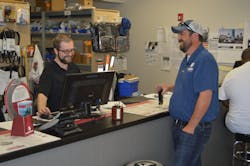Templates for establishing equipment user/service provider relationships
In today’s business environment, it is important to build and strengthen equipment user/service provider relations, especially in the area of streamlining communication and improving business processes. Relationships with third-party service providers need to be based on communication, performance, trust and accountability.
In the course of creating these business relationships, one essential element is defining the expectations of both parties to ensure mutual satisfaction of the service experience.
In this column, we’ve showcased the efforts of TMC’s S.16 Service Provider Study Group in developing recommended guidelines for fleet/service provider business practices. Each column has focused on a particular recommended practice (RP).
Among the TMC RPs – which are revolutionizing fleet/service provider relations – discussed:
- RP 1601, Guidelines for Measuring Equipment User Customer Satisfaction.
- RP 1602, Repair Order Authorization and Approval.
- RP 1603, Warranty Workflow Procedures.
- RP 1604, Rapid Repair Assessment.
- RP 1605, Justification for a Parts and Service Assistant.
- RP 1606, Standard Repair Time Implementation Guidelines.
- RP 1607, Technician Career Development.
- RP 1608, Conflict Resolution Guidelines.
- RP 1609, Quality Control Guidelines.
- RP 1610, Emissions Tampering Guidelines.
- RP 1611(T), Parts Acquisition for Service Providers.
In Progress
Going forward, the S.16 Service Provider Study Group is planning to expand on this base of important information with new recommended practices covering the following areas:
- Service event data transparency.
- Parts core management for service providers.
- Shop workload and prioritization.
- Mentor development.
- Implementing TMC RPs in fleet and service provider operations.
- Safety guidelines for mobile maintenance.
When adopted, they will join more than other 450 RPs that have been created for the purpose of improving maintenance efficiency and providing the industry with trucking solutions.
Kenneth Calhoun is vice president of customer relations for Truck Centers of Arkansas (www.truckcentersar.com), a full-service dealership headquartered in North Little Rock, Ark. He serves as a service provider director at large on TMC’s board of directors and is the immediate past chairman of TMC’s S.16 Service Provider Study Group. TMC (www.trucking.org/Technology_Council.aspx) is North America’s premier technical society for truck equipment technology and maintenance professionals.
About the Author
Kenneth Calhoun
Technology & Maintenance Council (TMC)
Vice President, Customer Relations, Truck Centers of Arkansas; Service Provider Director at Large, Technology & Maintenance Council (TMC) Board of Directors; Immediate Past Chairman, TMC S.16 Service Provider Study Group
